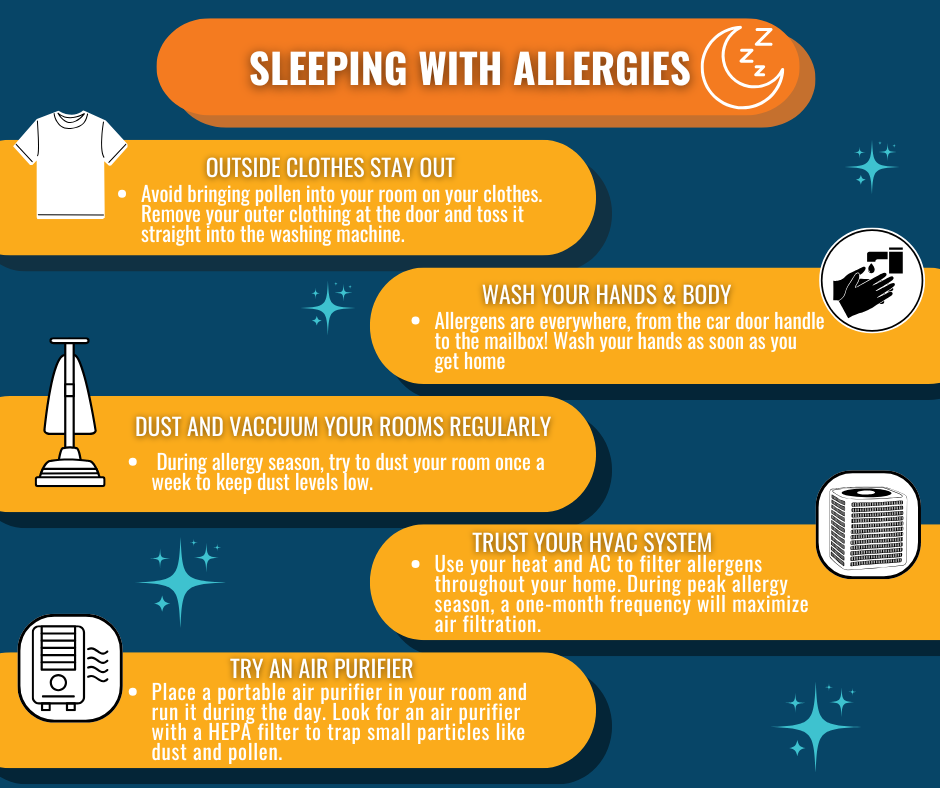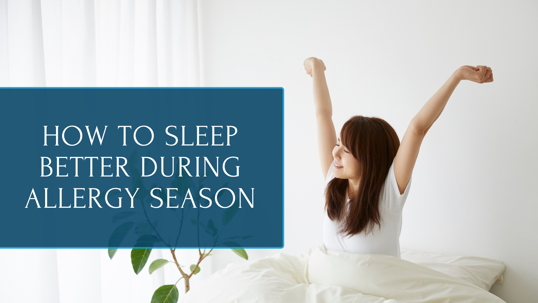Allergy sufferers in Port St. Lucie are all too familiar with the challenges of nighttime allergies, including symptoms like wheezing, coughing, and restless tossing and turning. During allergy season, it's crucial to tackle all potential irritants, not just pollen. Discover how to minimize allergens in your bedroom and why your allergies may worsen at night.
Allergies and Sleep: What’s the Connection?
Considerable research links allergies to poor-quality sleep, which contributes not only to daytime fatigue but also to an increased risk ofdeveloping a sleep disorder.
Unfortunately, there’s no such thing as an allergy-free home. Pollen, dust, and other airborne irritants are always present, at least in small quantities. Most of the time, your home’s air filtration system keeps the volume of irritant particles low. During pollen allergy season, the dry winter months, or in conditions that allow mold to grow or dust mites to thrive, the concentration of allergens may increase enough to cause or exacerbate allergy symptoms.

Keep Allergens Out of Your Bedroom
Roughly40% of Americans have seasonal allergies, which means there are millions of households trying to sleep with allergy symptoms.
Medication and sleep aids may help, but tackling the root cause of symptoms gives you a better chance at lasting relief.
If you’re tired of losing sleep to nagging allergy symptoms, give this tried-and-true anti-allergy playbook a shot!
1. Keep Pollen Out
During allergy season, keep windows and doors closed, especially from late morning to early evening, when pollen levels peak.
2. Shower Up
When you get home, remove your outer layers of clothing at the door and shower to get pollen off your skin and hair.
3. Banish Dust Mites From the Bedroom
Dust tends to accumulate more quickly in bedrooms than in other spaces in a home because they are more closed off and may lack ventilation. Because we spend much time in these spaces, expecting more dander is natural. Thoroughly cleaning your bedroom (dusting and vacuuming) frequently during allergy season may help to reduce the severity of your symptoms.
4. Keep Pets Out of the Bedroom
As much as Fido wants in the bed, keeping him out is best. Pet hair and dander are two of the most common indoor allergens. Provide your pet with a cozy place to sleep, ideally in a separate room (at least on the bedroom floor).
To further reduce your exposure to allergens, wash your pet’s bed as often as you wash your sheets—weekly!
5. Maintain Your HVAC System
A well-maintained HVAC system is the most effective tool for filtering indoor air throughout your home. In addition to scheduling annual maintenance, replace your air filter every one to three months to mitigate allergens and dust. If you have pets or underlying respiratory issues, replacing the filter every month can be beneficial, especially during allergy season.
6. Use an Air Purifier
Air purifiers filter indoor air and improve circulation, lowering the concentration of allergens in your bedroom. Look for a portable air purifier with a HEPA filter, which is rated to trap the smallest airborne particulates.
Read More: Three Ways to Improve Indoor Air Quality
Do Allergy Symptoms Get Worse at Night?
It’s not just you. Allergy symptoms are often worse in the evening when you’re headed to bed because of:
- Histamine – Histamine is the chemical that triggers allergy symptoms and tends to be present in higher levels at night.
- Pollen levels – Pollen brought into your bedroom during the day has had time to accumulate by nighttime. You may stir it up as you prepare for bed.
- Body position – Lying down changes how mucus moves through your sinuses. This can cause mucus to pool in your nasal passages, leading to sneezing and coughing.
- Temperature and humidity changes may affect nasal mucus production, contributing to increased irritation and post-nasal drip.
Will Sleeping with a Humidifier Help Allergies?
A humidifier may help some people with allergies by thinning mucus and moisturizing nasal passages, making breathing easier. However, excessive humidity can lead to mold growth, worsening allergies. Aim to keep indoor humidity between 30% and 50% for optimal air quality.
Take On Allergy Season with Help from Elite Electric, Plumbing & Air
There are many ways to lessen allergy symptoms and enjoy the changing seasons. Our friendly technicians are proud to help our Port St. Lucie area neighbors live more comfortably with allergy-friendly HVAC systems and more.
Call 772-356-1735 or contact us online to schedule HVAC, electrical, or plumbing services in Port St. Lucie, Jupiter, and the surrounding areas.

